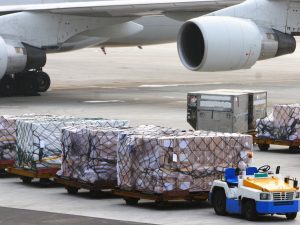Kamal Jain, Director, Cargomen Logistics said, “The ongoing Iran-Israel conflict and regional airspace closures will have a lasting impact on Indian air cargo. Prolonged diversions will increase transit times and air freight costs, especially for time-sensitive goods like pharma and perishables. Exporters may shift to multimodal options like sea-air via Dubai or Singapore. Congestion at Indian airports is likely, affecting reliability. In the long term, businesses will diversify routes and target alternate markets. The situation will also push policymakers to invest in resilient air corridors, develop alternate hubs, and strengthen aviation treaties to ensure continuity in trade and reduce vulnerability to geopolitical disruptions.”
Read More »Shiprocket, Fynd unite to boost last-mile deliveries
Shiprocket has announced a strategic partnership with Fynd to boost Shiprocket’s courier aggregation and ecommerce intelligence directly into Fynd’s Order Management System (OMS), improving last-mile fulfilment for growing D2C brands with the power of automation and AI-driven logistics. With this partnership, Fynd will also integrate Shiprocket’s logistics provider aggregation services, including courier selection, price comparisons, and order tracking, enabling brands on Fynd to fulfil orders using Shiprocket’s logistics partners. The service is already live for over 300 active D2C brands on Fynd’s OMS, With Shiprocket’s network of logistics providers, the partnership is expected to improve delivery timelines, especially in Tier 2 and Tier 3 markets, and enhance customer satisfaction. The API-based integration enables seamless syncing of order data, AI-driven courier selection, and order tracking—all within Fynd’s dashboard. Shiprocket’s technology stack provides brands access to broader pin code coverage, an open, intelligent ecosystem, and the operational flexibility to meet customer demands. Fynd’s AI-native operations and Shiprocket’s intelligent logistics provider allocation system will bring greater automation to the order fulfilment journey. “This partnership brings logistics automation and delivery optimisation to the fingertips of Fynd’s brand ecosystem. At Shiprocket, we’re focused on building the infrastructure that enables India’s brands to scale faster and serve customers better, especially in Tier 2 and 3 cities. Partnering with Fynd brings that vision to life for hundreds of growing D2C businesses,” said Atul Mehta, Chief Executive Officer (Domestic Shipping), Shiprocket.
Read More »‘Iran-Israel air space stations closure impacting perishables trade’
Sunil Kohli, Managing Director, Rahat Cargo says, “The closure of air space stations due to air strikes between Israel & Iran have resulted in the carriers to plan their flights via circuitous route which in turn results in higher consumption of fuel leading to the higher freight pricing especially in regard to the airfreight volume from India to Europe and West Asia. Furthermore, the Indian cargo industry is likely to face a difficult situation because of the delay in carriage due to longer routes especially in respect of perishable shipments and pharmaceutical products. Iran airspace closer has badly affected perishable cargo pan India outgoing/ incoming as many flight all over either canceled or diverted.”
Read More »IWS to focus on automation, drones & sustainability
The India Warehousing Show (IWS) 2025, is all set to be held from June 26 to 28, at YashoBhoomi, IICC, Dwarka, New Delhi. It will focus on automation & robotics, smart storage systems with IoT & AI, MHE Innovations, energy-efficient, green warehousing solutions and drone technology. The theme is ‘Smart, Scalable, and Sustainable Supply Chains.’ This year’s edition focuses on empowering businesses with cutting-edge warehousing, logistics, and automation solutions. The show brings together the entire supply chain ecosystem to explore real business opportunities, emerging technologies, and collaborative growth. The conference will focus on strengthening India’s warehousing and logistics sector through innovation, collaboration, and policy alignment. In addition, the show offers: Power-packed panel discussions, thought leadership sessions on automation, infrastructure, and cold chain and VIP Lounge access to facilitate networking among top-tier professionals.
Read More »‘System integration, data security, lack of skilled workforce to manage digital tools’
Vipin Vohra, Chairman, Continental Carriers said, “Despite rapid digital advancement, many logistics players remain hesitant to fully embrace technology. Key reasons include high implementation costs, especially for MSMEs, and a deeply entrenched traditional mindset that favours manual, tried-and-tested processes. There’s also apprehension around system integration, data security, and a lack of skilled workforce to manage digital tools. Moreover, the perceived disruption to ongoing operations often deters decision-makers. While larger firms are adopting tech for visibility and efficiency, widespread transformation requires a cultural shift, supportive policies, affordable solutions, and industry-wide collaboration to build trust in technology as a long-term value enabler.”
Read More »‘Apart from cost, businesses must consider training, maintenance & upgrades’
CK Govil, President, ACAAI said, “The logistics industry is the engine of global trade, yet it remains one of the slowest to fully adopt modern technology. While high costs and a traditional mindset are often cited as the main reasons, the reality is a combination of multiple, interrelated factors that continue to delay widespread digital transformation. Cost is certainly a major concern. Implementing technologies like Transportation Management Systems (TMS), Warehouse Management Systems (WMS), real-time tracking, artificial intelligence, or blockchain solutions often requires significant upfront investment. For small and medium-sized logistics firms — especially in developing countries — these costs are seen as a burden rather than a long-term investment. In addition to installation, businesses must consider training, maintenance, and upgrades, further adding to the perceived financial strain. Equally significant is the traditional mindset prevalent in many logistics organizations. A large portion of the industry is built on family-run or legacy businesses that have operated successfully using manual systems for decades. Change, especially technological, is often viewed as risky or unnecessary. This “if it’s not broken, don’t fix it” mentality creates strong resistance to innovation. However, limiting the hesitation to just cost and culture oversimplifies the issue. A less visible but equally important challenge is the lack of digital literacy and awareness. Many business owners and operational staff do not fully understand how modern technology can improve efficiency, reduce errors, and enhance customer satisfaction. Without this understanding, there’s little motivation to explore digital solutions. The fragmented nature of the logistics industry also poses a challenge. With thousands of independent operators — from transporters to freight forwarders — standardizing systems becomes difficult. Without interoperability across platforms, adopting technology in isolation can feel …
Read More »‘Legacy process dependency and limited digital literacy slow down adoption’
Kamal Jain, Director, Cargomen Logistics said, “The hesitation in adopting technology in logistics stems from both cost concerns and a traditional mindset. While larger players may have the resources, many SMEs fear high upfront investments and uncertain ROI. Legacy process dependency and limited digital literacy also slow down adoption. However, with rising compliance requirements and increasing volume handling demands, technology is no longer a choice—it’s a necessity. It is essential for visibility, speed, accuracy, and staying competitive in a dynamic global supply chain environment. It is advisable Adopt affordable, modular tech solutions, enhance digital literacy, promote ROI-driven models, and foster a change-ready culture through phased implementation—making technology adoption practical, scalable, and aligned with compliance and growth needs.
Read More »‘Financial investment major deterrent when it comes to tech adoption’
Sunil Kohli, MD, Rahat Cargo said, “The supply chain is a titanic industry which forms the backbone of global commerce and hence robust & advanced technology is needed to ensure optimal efficient and prompt results. The Industry driven by digital transformation is now becoming integral to modern logistics. However, entering into such modernisation has not been an easy task for the stakeholders as they face several challenges such as the cost of upgrading legacy systems to finding the right people to operate those systems. Moreover, Implementing new technology often requires substantial financial investment which seems to be a major deterrent before the industry players.”
Read More »Pune Airport records surge in air freight, handles 144 MT of cargo in single day
Pune Airport handled an unprecedented 144 metric tonnes of cargo between 6 a.m. on June 3 and 6 a.m. on June 4, 2025 and recorded its highest-ever freight volume in a single day. This operational milestone signals a new era for the city’s logistics ecosystem and underscores its emergence as a critical air cargo hub in western India, said reports. Of the total cargo moved, 72.73 metric tonnes were inbound while 71.24 metric tonnes were outbound. The spike in freight traffic reflects not only the surging industrial activity in and around Pune but also a broader shift towards faster, air-based supply chain models across India’s manufacturing corridors, said airport officials in report. Pune’s flourishing auto components, IT hardware and pharmaceutical clusters are driving higher volumes of time-sensitive shipments. Moreover, exporters from Maharashtra’s industrial heartland increasingly prefer air freight over road or rail to meet delivery timelines and global service-level agreements.
Read More »Hellmann to expand express airfreight offering in India, APAC, ME
Hellmann Worldwide Logistics is expanding its digital airfreight express solution, HEX, to North America with plans to roll the product out its product in Asia Pacific, India, the Middle East, Africa and Europe later this year. The door-to-door HEX solution, which is already live in Germany, the UK and Ireland, will be added to its US and Canada operations at the end of June. In the latter half of the year, Hellmann has plans to expand HEX to additional countries in the Americas as well as numerous markets in Asia Pacific, India, the Middle East, Africa and Europe. The goal is to offer this product in around 50 countries by the end of 2026. The service is tailored for small and medium-sized businesses and uses courier networks to bundle shipments centrally, with customs clearance managed by the express carriers. “The service is particularly valuable for imports to the US in view of the current US customs policy updates,” Hellmann said in a press release. The platform offers companies access to globally negotiated terms and conditions, removing the need for individual contracts with courier, express and parcel service providers. It also offers real-time shipment tracking, detailed analysis, and booking and invoicing processing via a central digital user interface, developed by software firm Shipsy. “HEX offers our customers an innovative solution that combines cost savings, reliability and excellent customer service,” said Timo Schamber, global airfreight vice president at Hellmann. “The cross-carrier customer service benefit is especially notable in the volatile and often fragmented courier and express services sector, where customers can use a single, dedicated contact person for all their needs.” Soham Chokshi, Shipsy’s co-founder and chief executive, added, “By integrating our …
Read More » Cargo Breaking News
Cargo Breaking News








